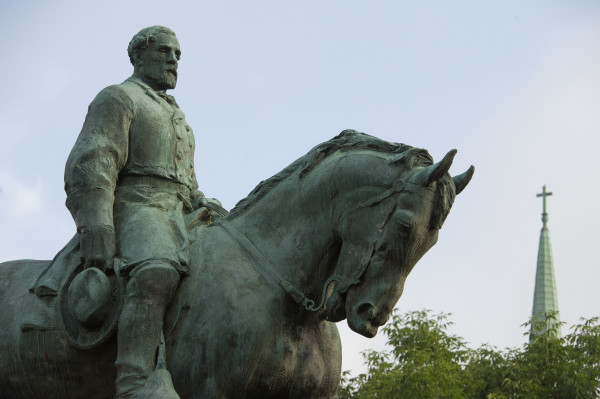

President Donald Trump has announced that none of the 10 Army based named for Confederate leaders will be renamed on his watch.
Army Secretary Ryan McCarthy had been open to the idea of renaming the bases following the Marine Corps’ decision to ban Confederate symbols from all of its installations. Then on Tuesday, the Navy announced a partial ban on Confederate paraphernalia.
But on Wednesday, the president tweeted that the 10 bases are not only part of American history, they represent the U.S. military at its best.
“The United States of America trained and deployed our HEROES on these Hallowed Grounds, and won two World Wars,” Trump tweeted. “Therefore, my Administration will not even consider the renaming of these Magnificent and Fabled Military Installations.”
A defense official referred questions on the matter to the White House.
The Confederacy was an alliance of Southern states that seceded from the rest of the country in an attempt to preserve and expand the institution of slavery.
They lost.
The bases are named for the following Confederate officers: Gen. Robert E. Lee, Gen. Braxton Bragg, Gen. Pierre Gustave Toutant-Beauregard, Gen. John Bell Hood, Lt. Gen. John Brown Gordon, Lt. Gen. A.P Hill, Lt. Gen. Leonidas Polk, Maj. General George E. Pickett, Brig. Gen. Henry Benning, and Col. Edmund W. Rucker.
Among those commanders: Gordon is believed to have become the leader of the Ku Klux Klan in Georgia; Pickett ordered the execution of 22 prisoners who had switched from the Confederate to Union army; Bragg was fired after being defeated at Chattanooga and was also roundly despised by his peers and subordinates; and Hood’s military career came to an ignominious end after his army was smashed at the Battle of Nashville.
Still, the Army began naming its installations after these Confederates following the United States’ entry into World War I. At the time, segregation was legal nation-wide and the southern states enforced a particularly virulent set of laws meant to subjugate African-Americans collectively known as Jim Crow.
President Woodrow Wilson was a Southerner and a supporter of segregation. He did nothing to protect African Americans from being slaughtered by white mobs during the bloody summer of 1919.
The debate about whether the bases should be renamed has taken a new prominence following public outrage over the death of George Floyd, who passed out and died after a white Minneapolis police officer placed his knee on Floyd’s neck for several minutes.
Retired Army Gen. David Petraeus has been one of the most prominent advocates for renaming the 10 bases. In a recent article for The Atlantic, Petraeus noted that all of the Confederate officers committed treason by siding against the United States.
“We do not live in a country to which Braxton Bragg, Henry L. Benning, or Robert E. Lee can serve as an inspiration,” Petraeus wrote. “Acknowledging this fact is imperative. Should it fail to do so, the Army, which prides itself on leading the way in perilous times, will be left to fight a rear-guard action against a more inclusive American future, one that fulfills the nation’s founding promise.”
